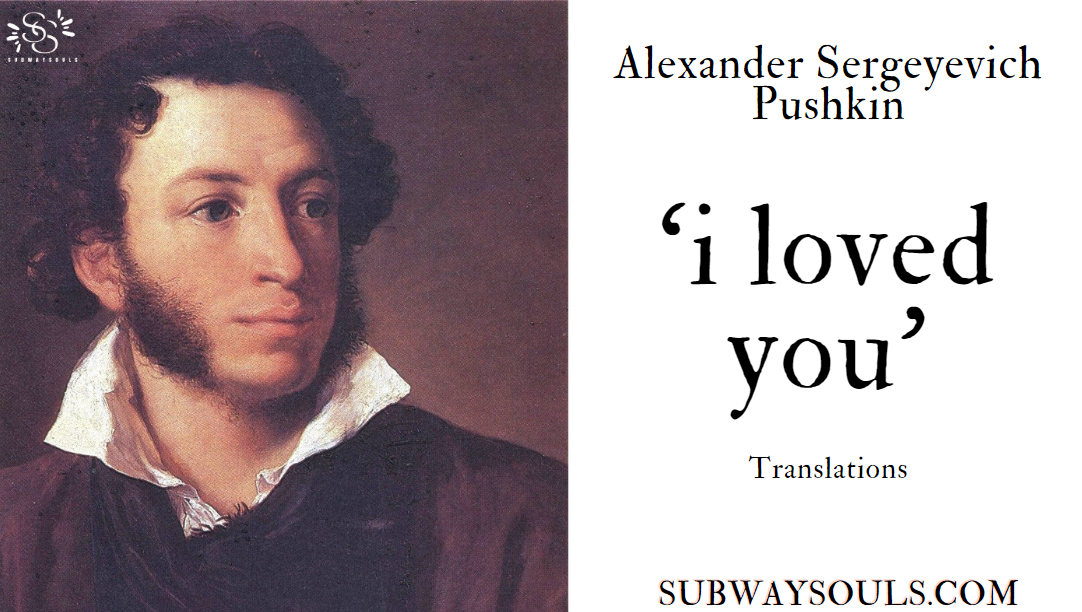Alexander Sergeyevich Pushkin [1799-1837]
Historians say, their opinions of course, that Pushkin with the way he used words may have emancipated the Russian language from its adolescent conventions and achieved a simplicity directness of speech and imagery that have few parallels outside the language of ancient Greece.
His ear, untrained and uninterested in music proper, is said to have had a unique instinct for combining, contrasting and exploiting the various vowel sounds and the extraordinary wealth of liquid, sibilant and guttural consonants that give the Russian language its beauty and variety, while he retained a simplicity and a naturalness of expression that often give his poetry and prose an almost conversational character.
My fascination today is not particularly with his poem ‘I loved you’. Of course its a great work and we coulkd deliberate all day but I like to see how it translates. Not theoreticallt but actual Russina word to English word. That simple. Like I am 3 year old!
To follow are some credited translations from Russian to English. Just because its worth a few minutes of our time.
I also like the idea that just because a writer can put heart and soul into a few words and feel the rest of the world will be saved because of this, doesnt mean the person with the eyes and ears and translator on the other side gets any where near the intended impact.
I Loved You

Has not extinguished in my heart;
But hence may not it trouble thee;
I do not want to make you sad.
I loved you hopelessly and mutely,
Now with shyness, now with jealousy being vexed;
I loved you so sincerely, so fondly,
Likewise may someone love you next.
Translation by Emil Sharafutdinov:
I loved you; even now I must confess,
Some embers of my love their fire retain;
But do not let it cause you more distress,
I do not want to sadden you again.
Hopeless and tonguetied, yet I loved you dearly
With pangs the jealous and the timid know;
So tenderly I love you, so sincerely,
I pray God grant another love you so.
Another translation:
I loved you once, nor can this heart be quiet;
For it would seem that love still lingers there;
But do not you be further troubled by it;
I would in no wise hurt you, oh, my dear.
I loved you without hope, a mute offender;
What jealous pangs, what shy despairs I knew!
A love as deep as this, as true, as tender,
God grant another may yet offer you.
Another Translation by Babette Deutsch:
I loved you; and perhaps I love you still,
The flame, perhaps, is not extinguished; yet
It burns so quietly within my soul,
No longer should you feel distressed by it.
Silently and hopelessly I loved you,
At times too jealous and at times too shy.
God grant you find another who will love you
As tenderly and truthfully as I.
Another translation by Dr. Daniel Feeback:
I loved you once; perhaps I should exclaim,
My love still lingers deep within my core.
But I do not want to cause you any pain,
So grieve thee not for me a moment more.
Silently and hopelessly I loved you,
Tormented, I was too jealous and too shy.
May God provide another who will love you,
Just as gently and as fervently as I.
Another version is at “A collection of poems by Alexander Pushkin”:
I loved you: and, it may be, from my soul
The former love has never gone away,
But let it not recall to you my dole;
I wish not sadden you in any way.
I loved you silently, without hope, fully,
In diffidence, in jealousy, in pain;
I loved you so tenderly and truly,
As let you else be loved by any man.
© Copyright, 1996, Translated by Yevgeny Bonver, August 1995,
A favorite for guest translations, here’s the original Russian along with a mostly literal translation:
I loved you: yet the love, maybe,
Has not extinguished in my heart;
But hence may not it trouble thee;
I do not want to make you sad.
I loved you hopelessly and mutely,
Now with shyness, now with jealousy being vexed;
I loved you so sincerely, so fondly,
Likewise may someone love you next.
The original Pushkin’s poem:
Я вас любил: любовь еще, быть может,
В душе моей угасла не совсем;
Но пусть она вас больше не тревожит;
Я не хочу печалить вас ничем.
Я вас любил безмолвно, безнадежно,
То робостью, то ревностью томим;
Я вас любил так искренно, так нежно,
Как дай вам бог любимой быть другим.
Analysis (ai): The poem’s focus on the speaker’s unrequited love and the desire to avoid causing emotional distress. The tone is restrained and introspective, conveying the speaker’s acceptance of the situation.
Characteristic of Pushkin’s Romantic style, the poem’s brevity and simplicity allow for a strong emotional impact. Its use of iambic tetrameter and cross-rhyming creates a regular beat that contrasts with the emotional turmoil expressed.
The theme of unrequited love is common in Pushkin’s work, and this poem echoes similar themes in other poems such as “To Her” and “A Conversation with the Bookseller.”
The poem’s time period, the 19th century, was a time of significant social and cultural change, and it reflects the Romantic movement’s emphasis on individual emotion and subjectivity.
Share this post: on Twitter on Facebook

